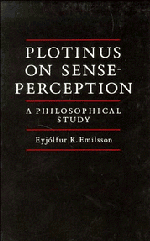Book contents
- Frontmatter
- Contents
- Acknowledgements
- Introduction
- I Plotinus' metaphysics
- II Plotinus' views on the soul and man
- III The relation between the eye and the object of vision
- IV Sensory affection
- V The unity of the senses
- VI The objects of perception
- VII Perceptions as acts and forms in perception
- VIII Conclusions
- Abbreviations
- Notes
- Bibliography
- Index
VIII - Conclusions
Published online by Cambridge University Press: 07 May 2010
- Frontmatter
- Contents
- Acknowledgements
- Introduction
- I Plotinus' metaphysics
- II Plotinus' views on the soul and man
- III The relation between the eye and the object of vision
- IV Sensory affection
- V The unity of the senses
- VI The objects of perception
- VII Perceptions as acts and forms in perception
- VIII Conclusions
- Abbreviations
- Notes
- Bibliography
- Index
Summary
In the previous chapters we have considered various aspects of Plotinus’ account of sense-perception. There are two topics that seem to me to stand out in this account in the sense that we have been led to them in many different contexts: Plotinus’ direct realism and his soul-body dualism. In this final chapter I summarize and expand our main conclusions concerning these two central topics. As regards the former, the survey given here is also meant to show how the main conclusions from previous chapters can be interpreted as elements in a single, relatively coherent view.
Judgement, affection and the objects of perception
We have seen that Plotinus’ doctrine is that the objects of perception are external objects and their qualities. It remains to be seen whether and, if so, how Plotinus reconciles this with his doctrine about the mediacy of sensory affections in perception. The problem can be stated as follows: perceptions are described as judgements; the judgements belong to the soul and they are to be sharply distinguished from sensory affections that belong to the animated body; the affections function as mediators between the soul and the external objects because the soul cannot directly assimilate sensibles; but if the affections are thus in between the external qualities and that which perceives, it may seem that the affections and not the external objects or qualities are what is immediately apprehended. Or how would Plotinus respond to such a charge?
First, let us recall what we noted in Chapter iv, that Plotinus holds that the affections are necessary in order to account for how we apprehend things in space.
- Type
- Chapter
- Information
- Plotinus on Sense-PerceptionA Philosophical Study, pp. 141 - 148Publisher: Cambridge University PressPrint publication year: 1988



